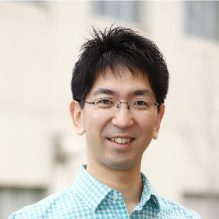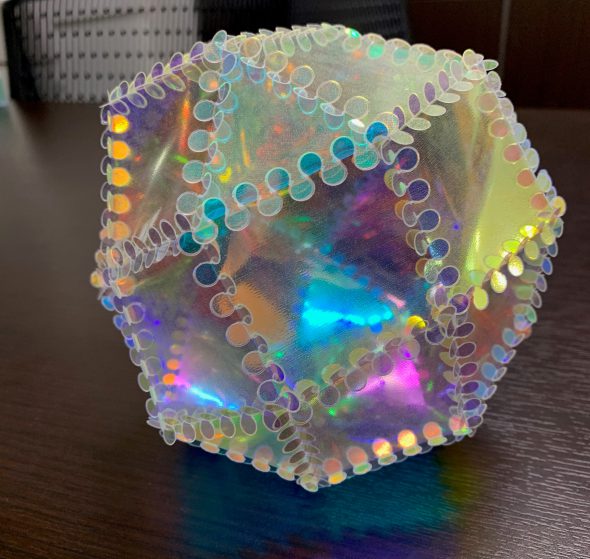-
About
- Kyoto Prize
-
Research Grants
-
News
This website uses cookies to improve the user experience. If you continue on this website, you will provide your consent to our use of cookies.
About
Research Grants
News

InaRIS Fellow (2022-2031)
Associate Professor,Institute for Advanced Study, Kyoto University*Profile is at the time of the award.
2022InaRISScience & Engineering
So surprised when I first learned that this "support for researchers themselves based on a long-term perspective” was finally put forward not from the government but a private organization. I will strive to repay my fortune being selected as the fellow of this pioneering venture, and hope to similarly benefit the next generation in the future, possibly through an academic achievement that will lead to the establishment of a foundation for researcher support.
We are developing foundational technologies that allow highly functional biomolecules to operate effectively outside their natural environments. Early in the project, it became clear that a stronger theoretical basis was needed. Therefore, during the first half of our research period, we focused on building this foundation. This involved deepening our understanding of molecular interactions and establishing mathematical approaches for the rational design of cage structures. Guided by these principles, we then successfully synthesized novel cage molecules with unique, non-conventional morphologies. Together, these theoretical and experimental advances lay essential groundwork for creating high-performance hybrid materials. Moreover, the design principles and synthetic methods we established offer potential as versatile core technologies for related fields.
Our initial approach involved applying precise molecular-level caging techniques to various target biomolecules. While early experiments were successful, it became apparent that a deeper understanding of fundamental principles was crucial for extending these techniques to diverse targets and optimizing their function. We therefore shifted our research strategy to prioritize building this foundational knowledge. This led us to focus on two primary challenges: (i) establishing rational design principles for cage structures, and (ii) developing a theoretical framework to quantitatively understand and predict how caging affects biomolecular function.
Significant progress has been made on both challenges during the research period thus far. Furthermore, the knowledge and techniques developed during this research show potential for broader applications, including the detailed analysis of molecular interactions. Consequently, we are actively pursuing intellectual property rights for our findings and preparing manuscripts for publication in peer-reviewed journals in due course. The progress on challenges (i) and (ii) is detailed below.
(i) Establishing Rational Design Principles for Cage Structures:
We developed mathematical approaches to better understand the wide range of cage structures formed by self-assembly and to enable the rational design of structures suited for specific functions. Our approach utilizes mathematical methods that focus on component connectivity and overall structural symmetry. This allowed us to build a framework for systematically classifying and predicting potential structures. Using this framework, we theoretically identified highly stable structural motifs with specific symmetries, and subsequently confirmed their formation through experiments. We also experimentally validated methods for precisely controlling the overall properties of the cage structures—including size, shape, and internal surface chemistry—by making targeted modifications, such as selectively adding or removing components. These advances provide a basis for designing custom cage structures tailored to diverse biomolecules.
(ii) Developing a Theory to Quantitatively Understand and Predict the Effects of Caging:
We developed a new theoretical framework to describe the distinct behaviors and reactivity of molecules in confined spaces or under restricted motion. This framework uses probabilistic modeling, focusing on the frequency of intermolecular encounters and local interaction biases. From this, we introduced a novel physicochemical index that quantifies effects overlooked by conventional reaction theories assuming homogeneous systems. While this index aligns with the standard concept of concentration in bulk systems, it offers a potential unified explanation for how spatial constraints and confinement at the nanoscale or molecular level impact the efficiency and selectivity of molecular recognition and chemical reactions. We anticipate that this theory will not only deepen the understanding of known chemical phenomena (like enhanced intramolecular reaction rates or local concentration effects) but also eventually aid in elucidating unknown mechanisms of biomolecular function. We confirmed the validity and utility of this theory by constructing and analyzing model experimental systems with precisely controlled intermolecular distances and arrangements. This work provides a critical theoretical and experimental basis for our ultimate goal of enabling biomolecule function within composite materials.
Many of the interconversions of chemical/light/electric/kinetic energy in living organisms take place with efficiencies approaching 100%. The energy conversion efficiencies of photosynthesis in plants and power generation of strong electric fish such as electric eels are so high that it cannot be reached by artificial means, and here we have good examples of how to minimize energy conversion losses. However, most proteins are fragile outside the biological environment and protection from the external environment are required in order to stably express their functions. Moreover, they cannot perform well in solids in which flexibility of the molecule is not ensured.
One solution to this problem is the development of precise and highly-functional matrices that allow proteins to function outside the biological environment. In this solution, it is necessary to tailor the pore size to the minimum necessary for inclusion of the target protein as a “single molecule” (i.e., no more than two molecules), in response to the diameter of the guest protein.
Dr. Fujita’s research proposal is to protect unstable protein molecules with a giant capsule-type molecule that he develops, and to utilize its functions. Dr. Fujita has already produced a new design guideline for self-assembled systems by introducing a mathematical viewpoint (graph theory). The guideline allowed us not only to understanding the structures of self-assembled products that were previously reported in a unified manner but also to design a new self-assembled structures, and he demonstrated that the size limit of cages could be expanded to nearly 10 nm, whereas the previous was 3-5 nm in diameter. The advantage of molecular cages with this size is to encapsulate most protein molecules, and Dr. Fujita proposes to use these cages to protect protein molecules and utilize functions of proteins in devices. Although this proposal originated from “the crystalline sponge method,” which applies the self-assembling cage to the structural analysis of protein molecules, invented by his mentor Dr. Makoto Fujita, it can be said that Dr. Daishi Fujita is novel in that he focuses on the flexibility of the cage when the molecules are conjugated and utilizes the physical functions of the guest protein molecules outside the biological environment.
While working on a project of a world record challenge for giant molecules assembly, Daishi Fujita had a dream: “What kind of world would open up if we could create a large molecular capsule?” He says just a dream at that time has become a realistic goal for scientific research, now that he found a way to create “a giant precise molecular capsule that can encapsulate a whole protein.” This dream could be a pathway to the creation of a new field of chemistry.
Dr. Fujita is a cutting-edge researcher of a new era in coordination chemistry, and with the support of the InaRIS Fellowship, we hope that he will continue to develop sophisticated research based on innovative ideas and open up the frontiers of materials research over the next 10 years.
Science & Engineering


